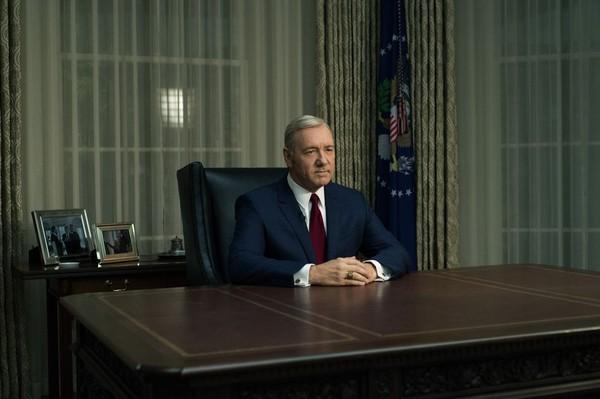
**Warning: this article contains spoilers.**
It turns out there may be a correlation between binge-watching and depression, according to a recent study from the [University of Texas](http://www.npr.org/sections/health-shots/2015/02/04/383527370/does-binge-watching-make-us-depressed-good-question). As someone frequently in the throes of a mental health crisis, the details of which don’t make for particularly exciting column fare, I can say the assessment is fair. That’s because consuming a TV show until your eyes are bloodshot is about as potent an antidepressant as you can find. Like visual Lexapro.
Netflix’s “House Of Cards,” the series that introduced the idea of releasing all the episodes of a season at once, remains the undisputed champ of this recent fad. I say that not because it’s the best show out there, or even close; there are more than a dozen programs that are objectively “better” than this, ones that share insights into the human experience or do things in a wholly original way. No, what Beau Willimon’s over-the-top political soap opera does better than most is distract. Consistently entertaining, occasionally surprising and sometimes confoundingly stupid, the drama is nevertheless endlessly watchable. You want to see what happens next, to whisper to yourself “just one more episode” until there are none left.
The fourth season of “House of Cards” represents a significant improvement over the tedious, policy-heavy third season, precisely because it’s starting to embrace the outlandishness that makes it so devilishly entertaining. In the beginning, the show, which is produced by filmmaker extraordinaire David Fincher, tried to present itself as a sort of high-prestige cross between “The West Wing” and “The Social Network.” But, really, it’s closer to another Fincher product — “Gone Girl.” Like that big screen book adaptation, it depicts a world of moody shadows and elegant cinematography in service of a bombastic story. And that’s perfectly fine.
This season, Kevin Spacey’s Frank Underwood, the murderous southern politician with the power to speak to the audience, is still the leader of the free world after his forced impeachment of President Walker. He’s in the midst of an election — the only part of the story that feels less crazy than our frightening Donald J. Trump reality — and his campaign is imploding. His cold-blooded wife/partner-in-crime/mortal enemy, Claire (Robin Wright), threatens to sabotage everything, which concerns both him and his human lapdog, Doug Stamper (Michael Kelly). This deliciously nasty game of political chess between husband and wife dominates the first third of these episodes, resulting in the two inexplicably becoming running mates. The major arcs from there on out deal with their race against well-groomed Republican nominee Will Conway (Joel Kinnaman), and the growing threat of Islamic extremists.
The show is at its worst when it’s trying to make nuanced political points, like how likable family man Conway turns out to be a con-man or how America’s looming Middle Eastern drones should make us question who the real terrorists are. These are both fair points to be made, but the binge-watchers of the world didn’t come here for eye-opening morality lessons. We came for Underwood’s hospital bed hallucination of a ménage-à-trois with the two people he has murdered; the immensely entertaining DNC convention that shows the interminable self-interest of these politicians; all those chilling speeches, unexpected deaths and calculating schemes that reveal themselves as they unfold. Lucky for us, Willimon and the writing staff have loaded up on these moments for the fourth go-around.
The season’s brilliant final stretch escalates every plot point to the point of absurdity, with Underwood’s presidential bid — and the country — devolving into wartime chaos. In the final scene, our drawling South Carolinian president looks into the camera and begins speaking about “making the terror.” Only this time, Claire joins him in the fourth-wall break. They have apparently morphed into one super-villain, a team and no longer a romance. Together, they’re our guides through this blood-stained dystopian fantasy.
As they glared at me, I almost wanted to look back at them and utter a thank you for the past 48 hours of television. Part of that may have been because my brain was in a delirious state, but mainly, it was because the pair had reduced all of my stresses to mere background noise.
That’s what’s great about binge-watching. As silly and maddening as it can be, that’s what’s great about House of Cards: It sweeps you up in its world.
_Edited by Katie Rosso | [email protected]_